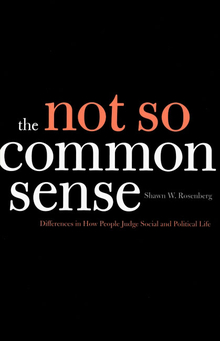The Politics of Public Management
WARNING
You are viewing an older version of the Yalebooks website. Please visit out new website with more updated information and a better user experience: https://www.yalebooks.com
Philip B. Heymann
How do political appointees chosen to head government agencies deal with the powerful political forces that surround them? In a fascinating and instructive book Philip B. Heymann, a professor of law who has held numerous government management positions, draws on his own experience and on the successes and failures of such prominent officials as Caspar Weinberger, Anne Burford Gorsuch, Les Aspin, Edward Meese, and Joseph Califano in order to explore the political context of high-level government management.
"[An] informative and well-written book."—Pat Wollter, Library Journal
"Philip Heymann in Politics Of Public Management provides a thoughtful analysis of how presidentially appointed managers must marshal troops and capital to advance their chosen goals."—William f. Weld, Harvard Law Bulletin
"A masterful examination of the role of political appointees in the ideal bureaucracy. . . . Not only has Heymann written a superb manual for would-be presidential appointees, he has written an insightful political history of the past decade and a half."—Issue in Science and Technology
"[Heymann] is able to demonstrate the full range of forces to which the public manager must be consistently and simultaneously accountable."—Nachman Spiegel, Jerusalem Post
"This book serves the very important function of demonstrating the interconnection between politics and administration by showing the similarities in practice of political and managerial decision making. Thus the reader is saved from the implicit invocation of tired analogies like the conveyor-belt theory and, at the same time, is presented with a realistic picture of politics. . . . This refreshing perspective permits Heymann to explore 'how an organization charts its path.'. . . A detailed analysis of the successes and failures of numerous political appointees from Anne Gorsuch to Michael Potschuk and from Griffin Bell to Edwin Meese. . . . What distinguishes Heymann's book are the final four chapters. . . . Heymann's skillful analysis of the basic conditions of influence—authority, persuasion, bargaining, appeal for the need for coordinating leadership, and reciprocity and loyalty—sets the groundwork for his concept of politics. . . . A wealth of ideas can be teased from this brief book. . . . It also represents a thoughtful analysis of the challenges and perspectives that are part of managing in a public agency. . . . A book well worth reading."—Raymond W. Cox, III, The American Review of Public Administration
"[A] informative and well-written book."—Library Journal
"A masterful examination of the role of political appointees in the federal bureaucracy. . . . Not only has Heymann written a superb manual for would-be presidential appointees, he has written an insightful political history of the past decade and a half."—Issues in Science and Technology
"The book is insightful, comprehensible, and simultaneously reflects his insider's perspectives combined with a commanding grasp of the uniqueness of the politics of public management in the federal government. Unlike other former political managers who have written what can be loosely described as 'exposes' or books aimed at enhancing their reputations, Mr. Heymann succeeds in providing us with an excellent analysis of how public policies are initiated, made and implemented without dwelling on the obvious, superficial, or trivial. . . . The book, then, is instructive and, more importantly, timeless."—Carl E. Meacham, Policy Studies Review
"An interesting mix of personal experience, academic analysis and illuminating anecdote. . . . Students of the policy process and the politics of bureaucracy will learn much from this original and interesting book."—Robert Williams, The American Politics Group Newsletter
"In my opinion, Heymann has written the most interesting book on the politics of management since Chester Barnard."—Theodore R. Marmor
"Heymann's insightful treatise on public management is based on his considerable experience in the government, both at State and Justice. His book will be of great help to those entering the public service for the first time and indeed to those in positions of responsibility now in government. It is must reading for those who wish to excel."—The Honorable Griffin B. Bell, Former Attorney General of the United States
"In this landmark book, Heymann explains why public management is exactly like business management in all respects but the most important: public managers are politically accountable. Heymann blends experience and scholarship in a brew sure to enlighten and engage. This should be required reading for anyone interested in the stormy relationship between politics and policy."—Robert B. Reich, Kennedy School of Government, Harvard University
"Heymann has written a sensitive and balanced analysis of how an Executive Branch officer should go about building a consensus for his policy. From now on, new appointees can learn the right technique before they come to Washington, instead of by sad experience."—Lloyd N. Cutler, counsel to the President, 1979-1981
"Professor Heymann draws on the real life experiences of public managers to illuminate the dilemmas faced by politically appointed executives. This book is sure to be valuable to both students and practitioners of the art of public management."—Dr. Alan K. "Scotty" Campbell, former director of the United States Office of Personnel Management, former Chairman of the U.S. Civil Service Commission, former Dean of the Lyndon B. Johnson School of Public Affairs, Univ. of Texas, former Dean of the Maxwell School of Citizenship and Public Affairs, Syracuse Univ.
"Practitioners and students of government can all learn much from this book. It contains powerful analyses illuminated by vivid stories of success and failure in the Washington arena."—Henry S. Rowen, Professor of Public Management, Graduate School of Business, Stanford University
"Heymann . . . has written a book which will be a classic in the emerging field of public management. . . . To the rich literature on private corporate management we now have a book which can serve as the foundation for an explanation of the very different and unique problems of management in a governmental and political context."—Stuart E. Eizenstat, Assistant to the President for Domestic Affairs and Policy Executive Director of the White House Domestic Policy Staff, 1977-1981
"A marvelous combination of analytic commentary and case illustrations, The Politics Of Public Management is filled with insights that are both powerful and original."—Richard E. Neustadt, Kennedy School of Government, Harvard University
"In this informative and well-written book, Heymann prescribes techniques for guiding an organization creatively and effectively."—Library Journal
"The Politics of Public Management focuses attention on a crucial and distinctive function of public sector managers: developing the support and establishing the legitimacy of their enterprises. Unlike the private sector where broad purposes and the authority to act on their behalf can often be taken for granted, in the public sector, managers must work constantly to define their purposes and retain the authority to act. It is as though the public sector managers confronted hostile take-overs every day. Heymann's book sheds important light on the nature of this problem, and the techniques that skilled pubic sector managers use to deal with it. This book breaks important new ground in our understanding of the special functions and skills of those who manage public enterprises."—Graham Allison, Dean of Harvard's John F. Kennedy School of Government
"A masterful examination of the role of political appointees in the federal bureaucracy. . . . Not only has Heymann written a superb manual for would-be presidential appointees, he has written an insightful political history of the past decade and a half."—Issues in Science and Technology
ISBN: 9780300042917
Publication Date: September 10, 1989
Publication Date: September 10, 1989
216 pages, 5 1/4 x 8








